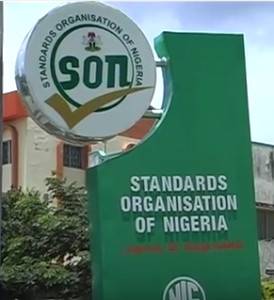-by our correspondent.
Intending importers of products in Nigeria can now heave a sigh of relief as the standard Organisation of Nigeria (SON) has made clear the steps involved in product registration while answering frequently asked questions.
In a presentation, the Assistant Director/Head Product Registration SON, Engr. Joseph Ugbaja, explained the scope of Product Registration its objectives, benefits to the importer and steps involved in the product registration process.
According to Engr. Ugbaja ,Product Registration is “a scheme that involves registration of imported products only adding that the objectives are: To Ensure that every product imported into Nigeria is registered and issued a number and logo before they are sold in the Nigeria markets; To ensure that only good quality products are sold in the Nigeria markets; To ensure traceability of all products; To ensure that Nigeria is not a dumping ground for substandard products and to protect the consumers and ensure that they get value for their money.”
On the benefits of product registration to the importer, SON noted that it protects the importer from people faking his products, especially if the importer is the Brand owner or sole distributor. Secondly the organisation will easily discover other entities importing or selling the importer’s products without permission and take legal action against the offenders as the unique logo will make it difficult for the product to be faked.
“If one of the models of a given product has a consumer complaint issue, rather than put on hold all the models of the product, the model in question (using the logo and number) will be put on hold while investigation is ongoing” Engr. Ugbaja said.
He outlined the steps involved In Product Registration to include; Application, Assessment of the Brands/Models, Issuing of Demand Note to importers, Payment of service charge to Treasury Single Account (TSA), Inspection/Sampling, Laboratory Test and Issuance of Certificate of Product Registration.
With regards to the documents required before registration of products the Agency listed the following; CAC Registration, Trade Mark Certificate, Letter of Authority to distribute the products in Nigeria, Application Form, Laboratory Test Result and Evidence of payment (TSA receipt)
The duration of the registration processes, according to SON, is six weeks from the date of payment to issuance of Certificate, adding that importers do not have to go to its Lekki office to make inquiries or register their products because there are desk offices in ASPAMDA, Alaba, Computer Village, Ikeja/Aluminium village, Dopemu in Lagos and in every state office of SON nationwide.
On the difference between Product Registration Certificate and Product Certificate, the Agency explained that Product Certificate is associated with SONCAP Certificate, while Product Registration Certificate is issued after the completion of product registration processes, noting that successful importers are usually contacted by SON when the Certificate, valid for a year, is ready.
With regards to challenges encountered by the agency in the course of registration, Engr. Ugbuaja noted that some importers are not willing to have their products tested because of fear of seizure if the product fails while a few other importers are not willing to have their products registered, as they prefer to evade any form of payment.
“As traceability remains one of the core objectives of product registration, some importers prefer to operate from hideouts and sell their products without registering them. Non-Renewal of product registration by clients whose registered products have expired is also a major challenge,” he added.
Despite the efficient service delivery, SON says it is not resting on its oars as the upgrade of its E-Product Registration portal for online registration is on-going while it is also creating Public Awareness through constant engagement with the electronic and print media as well as other stakeholders.









Comment here